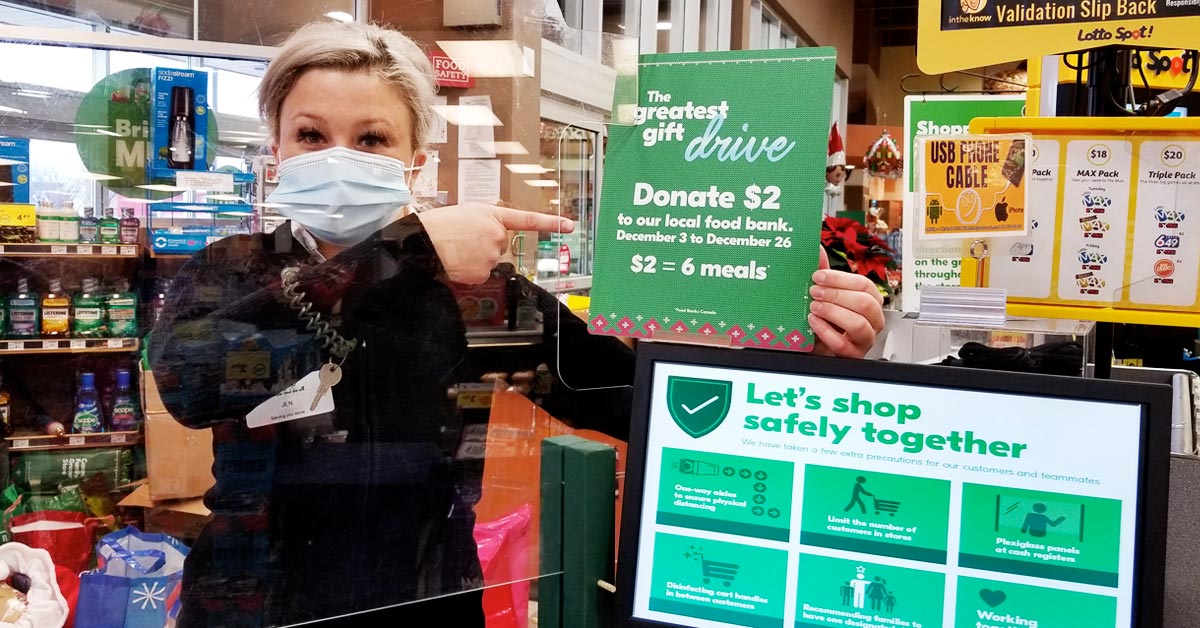A bite of information | The Blog
Rounding up, does it really help?

Myth busting giving at the till
Have you ever been asked to make a donation through the till when shopping at your local grocery store? Or been asked to ‘round up’ your bill?
If so, I’m sure you’ve also asked yourself, I wonder how the charity receives that money and the impact that your $2, $5 or $10 donation makes.
We are here to bust some myths about how this all works (in our experience) and to talk about the good you as the consumer are doing as well as the retail chain you shop at! Before we dive into the Q & A, we want to paint a little picture of the whole approach and what goes with a campaign to support local food banks.
Stores will often run a campaign in support of the Calgary Food Bank which will have multiple elements to benefit us. They will collect donations through the tills, promote donations of food (often through pre-packs), they will match fund donations by their customers and they will reach out to their suppliers to see if they’d like to give as well.
In 2019-2020, 1.8 million pounds of food was collected from public donation bins in the front of local grocery stores – most of that is in the form of $5 and $10 pre-packaged food bank bags. $490,000 was collected through grocery store tills and almost $55,000 was received as a corporate match during those promotions. This is just to the Calgary Food Bank alone!
Does the charity get all the money we, the consumer, donate through the till?
Yes. Each grocery chain that we work directly with submits a detailed report showing exactly how much is donated at each store.
How long does it take for the charity to get the money that is collected through the tills?
It depends on the retail chain, but on average it takes 2-3 months. Since most of these campaigns are national or regional in nature, once the chain has a chance to make sure their numbers are correct, they forward the donation to Food Banks Canada or Food Banks Alberta before it comes to us. If the donation is local, the time is a bit shorter, but it still takes a while for accounting to tally by store before releasing one cheque to us.
Does the charity get the money in the form of a cheque, gift cards or buying power?
Large, national chains prefer to send cheques, but smaller, regional chains usually provide payment in the form of gift cards or buying accounts. Even when the donation arrives in a form that encourages us to shop at their specific chain, we use our relationships with the stores to ensure we pay a discounted price for any goods we purchase.
Do stores match the donations that come in through the tills? How does this work?
Each campaign and retail chain operate a little differently. Here are a few examples of what we’ve seen:
- Some companies will match once a certain dollar amount is reached – I.e., once you’ve collected $2,000 through the tills, corporations will add an additional $2,000 to your store total.
- Some companies will match up to a certain dollar amount – I.e., corporations will match dollar for dollar up to the first $25,000. If you collect less than that, you get double the donations collected ($24,000 donated + $24,000 corporate match = $48,000), but once you pass that limit, donations are no longer matched ($26,000 donated + 25,000 corporate match limit = $51,000).
- Some corporate retailers don’t match donations at all.
Does the company collecting through the till (Walmart, Superstore, etc) get a tax break for the money collected through the tills when it’s given to the charity?
No, any money that is collected from customers is considered “collected funds” and corporations are not entitled to a tax receipt for that amount. They are only offered a tax receipt for the matching donation that is given by the company. For a large corporation, that matching amount has little to no impact on their bottom line.
Do the stores collect interest off the money collected through the tills while it’s in their account, before it goes to the charity?
Most corporations look at funds collected as an outstanding payment on their books. They want to clear that debt as quickly as possible. Any interest they accrue in 2 or 3 months would be negligible.
Do companies really feel a strong sense of corporate social responsibility or do they use charities as a marketing tool?
Most large corporations want their customers and employees to feel connected to the communities they serve and supporting charities is one of the ways that they do this – especially when the goal of the charity aligns with the values of the company.
In our years of experience working with grocery and large retail chains, we certainly feel the generosity from their strong sense of corporate social responsibility. Supporting causes close to their mission and their community is very important to them. Not only do large food retailers in Calgary collect donations through their tills, but they also glean their shelves of quality food to give to local food banks, connect us to their buying power when we need to purchase food and provide corporate donations to us. To say that they feel food banks are at the root of food rescue and food waste prevention for them is an understatement.
When you look at the full picture of how the Food Industry supports food banks, the stats are astounding. Thank you to all of the retail staff, store managers, head offices and community investment employees who support us and many other charities each and every day.


